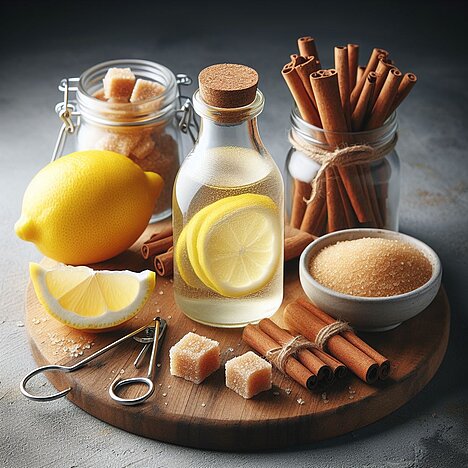Sorbitan monolaurate

Sorbitan monolaurate is an ester of sorbitol and lauric acid that is used as an emulsifier in foods, cosmetics and pharmaceuticals. It has the E number E 493 and the brand name Span 20. In this article you will find out what sorbitan monolaurate is, how it is produced, what its advantages and disadvantages are and whether it is suitable for your dog.
What is sorbitan monolaurate?
Sorbitan monolaurate is a sorbitan fatty acid ester, i.e. it consists of a molecule of sorbitol esterified with one or more fatty acids. Sorbitol is a sugar alcohol obtained from glucose. Lauric acid is a saturated fatty acid with 12 carbon atoms that is found in coconut oil and palm kernel oil.
Sorbitan monolaurate is produced by a chemical reaction of sorbitol and lauric acid, which takes place under high pressure and high temperature. This produces a mixture of different partial esters, which can be differentiated according to the number of esterified hydroxyl groups of the sorbitol. This means that there are mono-, di-, tri- and tetra-esters of sorbitan monolaurate.
Sorbitan monolaurate has the molecular formula C18H34O6 and a molar mass of 346.46 g/mol. It is a yellow, viscous liquid that is almost insoluble in water, but soluble in fatty oils and ethanol. It has an HLB value of 8.6, which means that it has both hydrophilic and lipophilic properties and therefore acts as an emulsifier. An emulsifier is a substance that helps to mix two normally immiscible liquids such as water and oil.
What is sorbitan monolaurate used for?
Sorbitan monolaurate is mainly used as an emulsifier in foods to ensure an even distribution of fats and oils. It is approved in the EU under the number E 493 as a food additive for certain foods, for example for various baked goods, ice cream, desserts, confectionery, jams and beverage whiteners. The permitted daily dose is 5 mg/kg body weight per day.
Sorbitan monolaurate is also used as an emulsifier in cosmetic and pharmaceutical preparations, for example in creams, lotions, ointments and sprays. It helps to improve the consistency and stability of the products and to distribute the active ingredients. It can also increase skin moisture and strengthen the skin barrier.
What are the benefits of sorbitan monolaurate?
Sorbitan monolaurate has several benefits as an emulsifier in food and other products:
- It is of plant origin and therefore suitable for vegetarians and vegans.
- It is heat-resistant and oxidation-stable and can therefore be processed at high temperatures.
- It is biodegradable and environmentally friendly.
- It has low toxicity and is considered safe for human consumption and application to the skin.
What are the disadvantages of sorbitan monolaurate?
Sorbitan monolaurate also has some disadvantages as an emulsifier in food and other products:
- It can trigger allergic reactions, especially in people with a hypersensitivity to sorbitol or lauric acid.
- It can cause gastrointestinal discomfort, such as flatulence, diarrhea or nausea.
- It can affect blood sugar levels as it is one of the sugar alcohols that are partially absorbed by the body.
- It can inhibit the absorption of other nutrients, such as vitamins A, D, E and K, which are fat-soluble.
Is sorbitan monolaurate suitable for dogs?
Sorbitan monolaurate is not suitable for dogs as it can lead to digestive problems and nutrient deficiencies. Dogs have a different metabolism to humans and cannot process sugar alcohols such as sorbitol well. They also have a higher need for fat-soluble vitamins, which can be affected by sorbitan monolaurate.
If you want to give your dog a product with sorbitan monolaurate, you should therefore always ask your vet for advice first. You should also read the ingredients list carefully and observe the dosage. If you notice any signs of intolerance or allergy in your dog, such as vomiting, diarrhea, itching or skin rash, you should stop using the product immediately and contact your vet.
Sorbitan monolaurate is an emulsifier made from sorbitol and lauric acid. It is used in foods, cosmetics and pharmaceuticals to achieve an even distribution of fats and oils. It has some advantages, such as its vegetable origin, high heat resistance and low toxicity. However, it also has some disadvantages, such as allergic reactions, gastrointestinal complaints and nutrient inhibition. It is not suitable for dogs as it can lead to digestive problems and nutrient deficiencies.
If you notice any signs of hypersensitivity or poisoning in your dog, you should see your vet immediately. We are not a substitute for a vet, but we try to be as accurate as possible. Every dog reacts differently and we recommend you get a second opinion or consult your vet if in doubt.
Stay healthy and take good care of your four-legged friend!😊